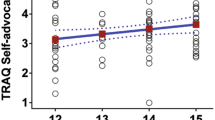Abstract
Mental health (MH) is an important, yet understudied area of care for patients with congenital heart disease (CHD). Pediatric subspecialty fellows believe MH should be within their scope of practice, but few feel confident in their ability to appropriately screen, evaluate, manage, and make treatment referrals for youth with CHD and concurrent MH concerns. A 6-session, didactic-based curriculum was designed by an interprofessional team of experts. It was administered to pediatric cardiology fellows over 9 months during two academic years. Topics included the following: Introduction to MH and CHD, MH Screening and Clinic-Based Interventions, Psychopharmacology, Delirium, Trauma-Informed Care, and Adult CHD and Transitional Care. An investigator-designed survey was developed to assess fellow comfort with MH knowledge, screening, and treatment recommendation domains. Twenty-three fellows participated with 14 completing the pre-post survey (58% participation, 11/17 in year 1, 3/6 in year 2). Most participants were in their first year of training (9/14, 57%). Overall, fellow comfort with MH topics increased significantly (mean score 2.89 ± 0.46 vs. 3.4 ± 0.4, p = 0.0005), with improved comfort in the MH knowledge (p = 0.003) and treatment recommendation domains (p = 0.001). A didactic-based MH curriculum improves the comfort of pediatric cardiology fellows to address the MH concerns of their patients. The topics in this curriculum will continue to be refined over time and could be generalized to training programs, both nationally and across pediatric specialties, to improve MH care for high-risk populations.

Similar content being viewed by others
Data Availability
No datasets were generated or analysed during the current study.
References
DeMaso DR et al (2017) Psychiatric disorders in adolescents with single ventricle congenital heart disease. Pediatrics. https://doi.org/10.1542/peds.2016-2241
Luyckx K et al (2016) Development and persistence of depressive symptoms in adolescents with CHD. Cardiol Young 26:1115–1122. https://doi.org/10.1017/S1047951115001882
Kovacs AH et al (2009) Depression and anxiety in adult congenital heart disease: predictors and prevalence. Int J Cardiol 137:158–164. https://doi.org/10.1016/j.ijcard.2008.06.042
Gonzalez VJ et al (2021) Mental health disorders in children with congenital heart disease. Pediatrics. https://doi.org/10.1542/peds.2020-1693
Awaad MI, Darahim KE (2015) Depression and anxiety in adolescents with congenital heart disease. Middle East Curr Psychiatry 22:2–8
Areias ME et al (2013) Long term psychosocial outcomes of congenital heart disease (CHD) in adolescents and young adults. Transl Pediatr 2:90–98. https://doi.org/10.3978/j.issn.2224-4336.2013.06.02
Jackson JL et al (2015) Emotional functioning of adolescents and adults with congenital heart disease: a meta-analysis. Congenit Heart Dis 10:2–12. https://doi.org/10.1111/chd.12178
Karsdorp PA et al (2007) Psychological and cognitive functioning in children and adolescents with congenital heart disease: a meta-analysis. J Pediatr Psychol 32:527–541. https://doi.org/10.1093/jpepsy/jsl047
Ko JM et al (2018) Clinical and psychological drivers of perceived health status in adults with congenital heart disease. Am J Cardiol 121:377–381. https://doi.org/10.1016/j.amjcard.2017.10.038
Muller J, Hess J, Hager A (2012) Minor symptoms of depression in patients with congenital heart disease have a larger impact on quality of life than limited exercise capacity. Int J Cardiol 154:265–269. https://doi.org/10.1016/j.ijcard.2010.09.029
Malas N, Plioplys S, Pao M (2019) Depression in medically Ill children and adolescents. Child Adolesc Psychiatr Clin N Am 28:421–445. https://doi.org/10.1016/j.chc.2019.02.005
Green CM et al (2022) Preparedness of pediatric subspecialty fellows to address emotional and mental health needs among children with chronic medical conditions. JAMA Pediatr 176:1266–1268. https://doi.org/10.1001/jamapediatrics.2022.3451
Kern DE (1998) Curriculum development for medical education: a six step approach. Johns Hopkins University Press, Baltimore
Jensen PS et al (2011) Overlooked and underserved: “action signs” for identifying children with unmet mental health needs. Pediatrics 128:970–979. https://doi.org/10.1542/peds.2009-0367
McMillan JA et al (2020) Preparing future pediatricians to meet the behavioral and mental health needs of children. Pediatrics. https://doi.org/10.1542/peds.2018-3796
Harris E et al (2019) Mental health training in pediatric residency: where can we go? J Pediatr 211:4–6. https://doi.org/10.1016/j.jpeds.2019.05.075
McMillan JA, Land M Jr, Leslie LK (2017) Pediatric residency education and the behavioral and mental health crisis: a call to action. Pediatrics. https://doi.org/10.1542/peds.2016-2141
Acknowledgements
The authors would like to acknowledge The Medical Education Scholars Program in the Department of Learning Health Sciences at the University of Michigan Medical School in the development of this curriculum.
Funding
This study was funded by a Faculty Development Fund Grant from the Center for Research on Learning and Teaching at the University of Michigan.
Author information
Authors and Affiliations
Contributions
AM, NM, CD, KR, KP, and MC wrote the educational objectives and curricular content. AM, HL, CV, SO and MC conceptualized the curriculum. AM drafted the initial manuscript, and all authors reviewed and edited the manuscript.
Corresponding author
Ethics declarations
Competing interest
The authors have no competing interests, financial or otherwise, to declare that are directly or indirectly related to the work in this manuscript.
Additional information
Publisher's Note
Springer Nature remains neutral with regard to jurisdictional claims in published maps and institutional affiliations.
Rights and permissions
Springer Nature or its licensor (e.g. a society or other partner) holds exclusive rights to this article under a publishing agreement with the author(s) or other rightsholder(s); author self-archiving of the accepted manuscript version of this article is solely governed by the terms of such publishing agreement and applicable law.
About this article
Cite this article
McCormick, A.D., Owens, S.T., Lim, H.M. et al. A Novel Mental Health Curriculum Pilot for Pediatric Cardiology Fellows: Preparing the Subspecialist to Expand the Team. Pediatr Cardiol (2024). https://doi.org/10.1007/s00246-024-03532-7
Received:
Accepted:
Published:
DOI: https://doi.org/10.1007/s00246-024-03532-7




